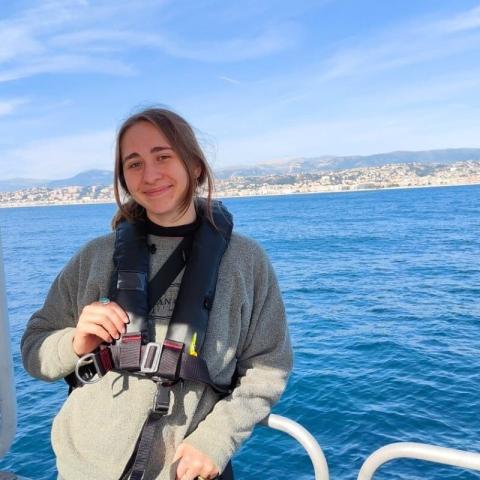From Irish bogs to Mediterranean meadows: Maya Bauer's environmental impact and blue energy innovation

From the rich historical peat bogs of Ireland to the dense meadows of seagrass covering the Mediterranean floor, Maya Bauer’s adventures in environmental science have grown exponentially, since she graduated from Mercyhurst University in 2021.
As a woman of science, Bauer believes strongly in the intersection of science and society. “I have always been passionate about increasing the effectiveness of scientific communication to the public,” she said. “In my opinion, science can never be fully impactful if it is not shared in an accessible way to the world.”
In her quest to do just that, Bauer has participated in public speaking engagements and community science exhibitions, created science-inspired art to communicate her research, and, most recently, partnered with a colleague to launch a start-up with the goal of producing habitat-restorative blue energy.
As a Fulbright scholar, Bauer spent a year after graduation in Westport, County Mayo, Ireland, where she created a storytelling project that illustrated the degradation of peat bogs, the vast number of species that inhabit them, and their historical and cultural value to the region. Her studies involved presenting at community events, where she encouraged residents to share their perspectives.
In reflecting, she said, “My Fulbright experience gave me lifelong friendships and completely changed my viewpoint on what is possible as a young person in environmental science. It taught me to be adaptive, the incredible power of community, and that anything can be achieved if you are brave enough to pursue your passions.”
Today, Bauer is working on her master’s degree in Marine Biology, Conservation, and Innovation at the University Côte d’Azur in Nice, France. During her time in Nice, she became familiar with an endemic seagrass species known as Posidonia oceania, which she described as a powerful carbon sink, making it instrumental in the fight against climate change. Posidonia covers vast areas of the Mediterranean floor, growing in dense meadows with long leaves that roll gently with the waves.
“Even after two years, the beauty of these fields honestly takes my breath away,” she said. “It is a protected species and is threatened by a number of factors in this region, notably boat anchor damage, heat waves, and pollution. As I continue to learn more about this species and the threats it faces, I have come to feel very strongly about the importance of active protection and restoration of P. oceanica.”
Bauer’s feelings about the scientific and societal value of protecting Posidonia are shared by her friend and fellow grad student, Nikita Rose. For the last two years, they have been researching and developing a start-up company they named NEMA.
“The concept of NEMA is the generation of habitat-restorative blue energy,” Bauer explained. “That is energy that is produced by the movement of waves, which also hosts restoration sites for P. oceanica cuttings. In this way, we will be able to help fill the global energy demand while actively restoring Posidonia meadows.”
Bauer and Rose recently took their concept to the Monaco Ocean Protection Challenge, where they were awarded a grand prize. The event was held by influential organizations, such as The Prince Albert II of Monaco Foundation, The University of Monaco, The Institut Oceanographique of Monaco, and Monaco Impact.
“It was a great honor to accept our award in the presence of His Serene Highness Prince Albert II,” Bauer said, still awed by the opportunity and, better still, the win.
As her exciting journey continues, Bauer doesn’t hesitate in crediting Mercyhurst for setting her on the right path.
“It was at Mercyhurst that I learned from a number of exceptionally inspiring and accomplished professors, some of whom remain part of my life today,” she said. “I was a dual-major, earning a B.S. in Environmental Science and a B.A. in Spanish, so my time was spent in two spheres that are probably not typically thought of as overlapping… but I found that they not only granted me the space to view my studies with different perspectives, but the professors often encouraged me to use my knowledge of the other subjects to make my work more interdisciplinary. This willingness to be creative and to push the boundaries of higher education is something that has impacted me greatly and continues to influence my work as a marine biologist today.”
She acknowledged Dr. Mike Campbell, Dr. Nick Lang, Sarah Bennett, and Dr. Chris Dolanc in Environmental Science “for inspiring me with their deep sense of academic rigor and encouraging me to see the world with curious eyes.” She also credited Dr. Alice Edwards and the late Dr. Karen Williams in Spanish “for their incredible devotion to their students, their exceptionally high academic standards, and for making their teachings extend beyond the classroom.”
She said these professors, as well as other faculty and staff members, gave her the keys to “become a global citizen… the time I spent learning from them has been one of the greatest gifts of my professional life.”
Bauer and Rose are currently developing their prototype and searching for investors and mentors for NEMA.
“It is an exciting time for us, to be beginning the adventure into entrepreneurship together as women in science,” she said.
Bauer said anyone interested in getting in touch with her or learning more about NEMA can email find.nema@gmail.com.